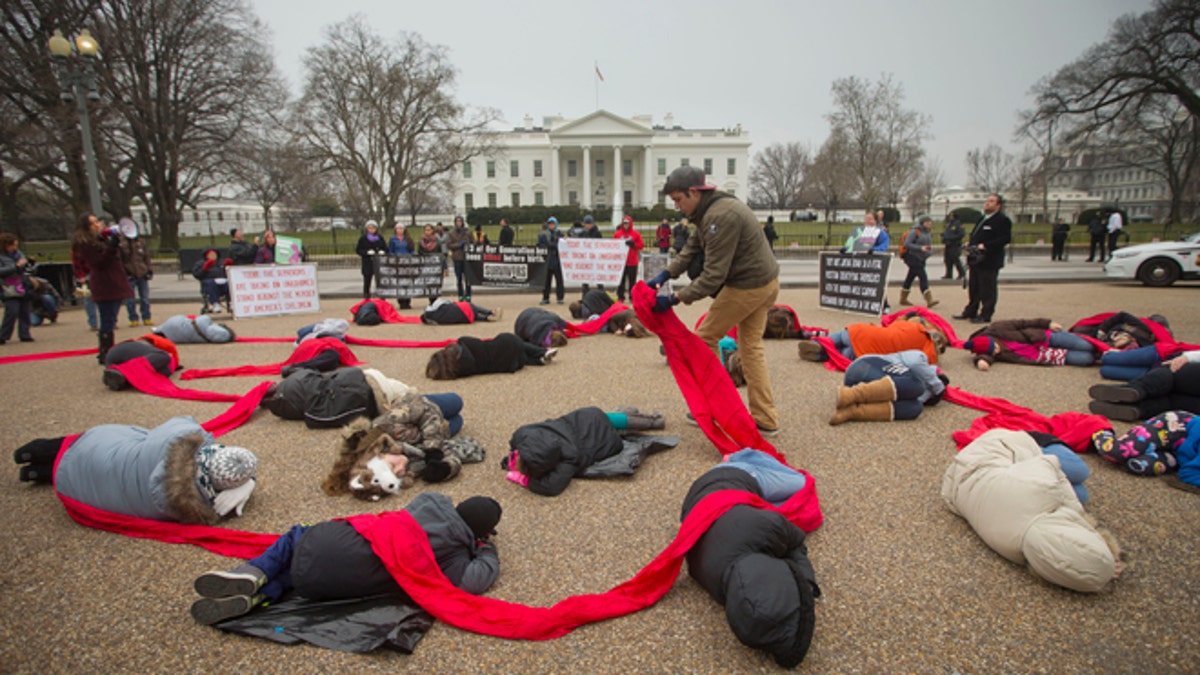
Anti-abortion rights activists protest in front of the White House in Washington, Jan. 21, 2015. (AP)
I happen to be Hispanic and a practicing radiologist, so although I wanted to speak about Hispanics and their place in the abortion debate at the March for Life in Washington, DC, I’m going to talk about prenatal diagnosis.
This year’s March for Life theme focuses on the fact that once a baby in utero is shown to have a “defect,” it is often summarily dispatched. Having soundly rejected eugenics as practiced by evil regimes in the last century, we are doing our own soft eugenics before birth. Nowhere are the statistics more shocking than with Down’s Syndrome (around 85 percent termination rate in the U.S.).
Having been buffeted by world events, sometimes violently, we have learned a great lesson: our families are our refuge, the one place where we can always find unconditional acceptance and support.
While doing research on the topic I discovered something very interesting: the rates for termination as a result of poor prenatal diagnosis have been shown in some studies to be significantly lower for Hispanics than for Caucasians. That fact made me stop and wonder why. I can’t answer it with scientific certainty, but I have some good ideas.
Last year at the March, more than half a million people participated, shivering with cold, but filled with fervor. This is truly a grassroots movement and it makes wonderfully apparent what a great country we live in. There is a “sacred” space in our politics for the expression of deeply held beliefs, even when they conflict with established law, the forces of academia, and the forces of a rotten entertainment culture.
The crowd is very young. The old guard is there, of course, but the great chanting and singing groups are high school and college students, infectiously smiling and laughing in the bitter weather. Last year many of them were Latino. We ran into our friends Javier, Cristina, Fernando, and Daniel. We saw countless banners in Spanish, declaring belief in human dignity.
I remembered then that the future of our country belongs to the young, and a large proportion of the young are Latino. Who better to support the dignity of humans than Hispanics? For us, nothing is more sacred than our families, our children, and our faith. Having been buffeted by world events, sometimes violently, we have learned a great lesson: our families are our refuge, the one place where we can always find unconditional acceptance and support. And every member of our family is of great worth, no matter how “imperfect.” The added value of having abuelita’s gentle influence in the house, even when she can no longer be physically useful, is infinite. Likewise, the son or daughter with Down’s brings a joyful tenderness to every interaction.
While our country is great, it has some of the most liberal abortion laws in the world. The availability of this “reproductive service” is of paramount importance to a culture which prizes sexual liberation so highly. Latinos increasingly reject the results of this way of thinking: the objectification of women, the disdain for children, and the destruction of the family.
The beautiful Hispanic youth that will march in Washington with great joy, despite the snow and cold, may not know or understand all these harsh realities. But they will be very clear on what they learned at home and at church: every human is valuable and unique. They learned that while watching their Mom and Dad care for their elderly grandparents with tenderness and respect. They also learn it each time they hear, joyfully announced, that there is a new brother, cousin, or grandchild on the way. It won’t matter if the child is unexpected or not altogether perfect. He or she will be embraced and cherished, an indispensable part of “la familia.”
